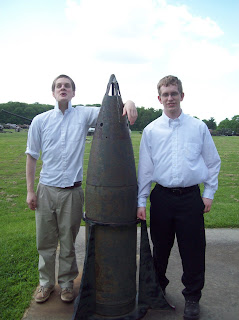For the newcomers, I
wrestled in high school. I still think it is one of the great contests of skill and strength, even after the intervening time that I've been able to play basketball and other popular sports with fellow missionaries. I also still think it has some of the greatest teaching opportunities. I remember one wrestling match I had, against another team with a history of winning and the specific guy I was against was ranked much higher than I was. This story will involve some terms specific to wrestling, and to save space here I will direct you to an article on the
rules.
Amazingly, I was able to get ahead during the first two (of three) periods and most of the third. Not only was I ahead, but I had three points on this guy and I was feeling good. There was only 30 seconds left, and we were both on our feet. Since the guy I was wrestling had much more experience than I did (I had at most one year and he surely had three or four years, if not more, under his belt), winning by a small margin would be all I could hope for. I didn't need any more points, and if I got too adventurous I could easily have put myself in disadvantageous position and maybe even have gotten pinned. All I needed to do was endure without making a mistake, but also not retreat (that's called stalling and costs points). I needed to "power stance."
 |
| A standard wrestling match for me |
Power Stance is what my coaches would tell us to keep pushing, be aggressive and make your foe understand that you aren't done, but don't do anything that might compromise your win. It takes power and endurance in the last period, and is not easy. You are tired, you've just used all of your strength and agility to get ahead, and after everything is left on the mat you need to leave a bit more. It might be the hardest thing you've ever done, yet it is essential to keep going in order to win.
Unfortunately for my record, I did not power stance properly. I was overconfident and my foe took advantage of a foot that slipped too far and I was too weak in bringing it back. He took me down, and even got near to pinning me, and in those last 30 seconds I gave up 5 points and lost the match. I now look back, and though I know that that one match wouldn't have changed too much of my life I still wish I could have endured a little bit better.
All of us have the opportunity every day to endure, be it well or not. Our life is much like a wrestling match, one where we are ahead at the start and as we apply Christ's grace into our lives. However, we are still constantly under attack, and if we slip up we are always in danger of falling under the influence of Satan. We too need to use a "power stance," or a certain method of aggressively protecting ourselves from his attacks. As we listen to the words of God, found in
scripture or the words of His
prophets, we will be educating ourselves as to how to power stance. As we apply the things we learn, we'll be properly holding the power stance. And as we execute the power stance all the way to the end of our life, we will hear those blessed words: "Well done, thou good and faithful servant" (
Matthew 25:21).











